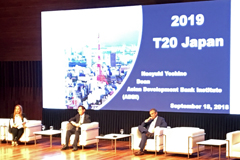Sharing Japan’s SDG Initiatives and Support for Africa at the Think 20 Summit
2018.11.26
The Think 20 (T20) Summit was held in Buenos Aires, Argentina, on September 17 and 18, 2018. Yasuo Fujita, deputy director at the Japan International Cooperation Agency Research Institute (JICA-RI), and Ryosuke Nakata, chief economist at JICA, were in attendance, and Izumi Ohno was invited as an expert. Ohno was a professor at the National Graduate Institute for Policy Studies (GRIPS) at the time and is now director of JICA-RI.
T20 is a network of research institutes and think tanks from around the world. It is one of the G20’s engagement groups (multiple civil society stakeholders assembled for specific agendas or functions), and it provides policy recommendations to the G20. T20 is organized and hosted each year by think tanks in the country chairing that year’s G20 Summit.
Approximately 1,000 researchers and specialists from 68 countries participated in this T20 Summit, including such notable experts as Professor Jeffrey Sachs of Columbia University and Vera Songwe, United Nations Under-Secretary-General and executive secretary of the Economic Commission for Africa. At the beginning of the conference, the communiqué containing the T20’s policy recommendations was handed to President Mauricio Macri of Argentina.
The communiqué highlighted the importance of cooperation for overcoming multilateral issues, and appealed for the necessity of redesigning the multilateral trading system, fulfilling the Paris Agreement on climate change, and the design of a new social structure (for example, addressing inequality, closing gender gaps, and responding to the digital economy). They urged the G20 with its representation, diversity, and flexibility to take collaborative action through international forums that could tackle these issues. Additionally, during the conference, participants voiced their concerns regarding the recent trade frictions, nationalism, and social problems.
Japan is the G20 chair for 2019, so Japan will also be hosting T20. Ten issue-specific task forces have been launched for T20 Japan. JICA-RI will coordinate two of those task forces: “2030 Agenda for Sustainable Development (Sustainable Development Goals: SDGs)” and “Cooperation with Africa.” During this conference, JICA-RI participated in discussions related to these two task forces, and coordinated the views of related parties with regard to the policy recommendations for T20 Japan. In particular, Professor Ohno and Deputy Director Fujita attended panel discussions as panelists.

Japan will be hosting T20 in 2019
Ohno took part in the panel discussion “National Implementation of the 2030 Agenda in the G20” to discuss with attendees from Germany, France, India, and Mexico about each country’s implementation status and framework for the 2030 Agenda and the possibility of G20 countries reporting in a common format to promote implementation. Ohno discussed the distinctive features of Japan’s efforts, including the pursuit of the “Japanese SDG model,” the use of a whole-government approach and involvement of multi-stakeholders (via roundtable discussions), and activities that bridged the link between Japanese domestic issues and international cooperation in eight priority areas specified by the SDGs Implementation Guiding Principles. She also pointed out the necessity of raising awareness of the SDGs among society in general as a challenge for Japan.
Fujita attended the “Cooperation with Africa” panel discussion, in which he discussed the direction of support for Africa by G20 and the G20 nations and the issues involved with other attendees from Germany, India, South Africa, and the United Nations. Fujita spoke about the Free and Open Indo-Pacific Vision (*1) and the Tokyo International Conference on African Development (TICAD) initiative (*2) as well as TICAD 7, which will be held in August 2019 in Yokohama, Japan. He then mentioned the three priority areas addressed at TICAD VI — economic diversification and industrialization including quality infrastructure and human resource development, improving health care systems, and social stability through education and vocational training for youth — and stated there was a high probability that these areas would also be brought up at G20 and TICAD 7 in 2019.

Izumi Ohno, then professor at the National Graduate Institute for Policy Studies (GRIPS) and now director of JICA-RI (second from right)
JICA-RI will be collaborating with think tanks and researchers in Japan and around the world in order to contribute to the T20 policy recommendations for the G20 Summit in 2019.
(*1): According to this vision, the key to the stability and prosperity of the international community is the dynamism created by the synergy between two continents— Asia, which is recording remarkable growth, and Africa, which is full of potential—and two free and open seas—the Pacific and the Indian Oceans.
(*2): An international forum for African development, co-organized by the UN, UNDP, the World Bank and the African Union Commission (AUC) under the leadership of Japan since 1993.

事業事前評価表(地球規模課題対応国際科学技術協力(SATREPS)).国際協力機構 地球環境部 . 防災第一チーム. 1.案件名.国 名: フィリピン共和国.

事業事前評価表(地球規模課題対応国際科学技術協力(SATREPS)).国際協力機構 地球環境部 . 防災第一チーム. 1.案件名.国 名: フィリピン共和国.

事業事前評価表(地球規模課題対応国際科学技術協力(SATREPS)).国際協力機構 地球環境部 . 防災第一チーム. 1.案件名.国 名: フィリピン共和国.

事業事前評価表(地球規模課題対応国際科学技術協力(SATREPS)).国際協力機構 地球環境部 . 防災第一チーム. 1.案件名.国 名: フィリピン共和国.

事業事前評価表(地球規模課題対応国際科学技術協力(SATREPS)).国際協力機構 地球環境部 . 防災第一チーム. 1.案件名.国 名: フィリピン共和国.
scroll